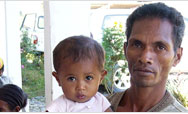You are here » Home » Telling Our Story
Success Story
Association emerges
as leader on making
IT resources accessible
Telecenters Adapt to Disabled People

Photo: Matt Brown/ World Learning
"Kristina Tsanova, from the PC3 Telecenter Association in Pravets, shares the
Association's advice on adapting telecenters to meet the needs of people with disabilities."
Nelly Petrova, executive director of the PC3 Telecenter Association, said, “The initial seminar introduced us to relevant technologies and some excellent practitioners, whose advice and partnership we continue to seek years later in many aspects of our work.”
USAID helped establish Bulgaria’s first 10 telecenters in 2001, responding to a need for information technology resources in economically disadvantaged locations. The telecenters, where the public can access the Internet and other IT services, partnered with and provided services for various community stakeholders. USAID also helped the telecenters unite through a national PC3 Telecenter Association.
Meeting the needs of people with disabilities, however, presented unique challenges to telecenters, who were not yet equipped with either the knowledge or resources to adapt. Such adaptations might include access ramps and space at the computers to accommodate wheelchairs, computer mice that people with muscular disorders can easily manipulate, as well as large-print monitors for the visually impaired.
To increase knowledge about the topic, USAID organized a five-day workshop in conjunction with a Bulgarian non-governmental organization. Joined by a group of Bulgarian experts, together they provided a thorough introduction to a variety of issues and resources related to information and technology work with people with disabilities. The participants gained awareness of the needs of people with disabilities and suitable approaches to addressing those needs. They also acquired knowledge of tools and resources available to facilitate access to the centers and use of the equipment inside for disabled persons.
Among the most successful telecenters in Bulgaria to accommodate the needs of people with disabilities is the PC3 Telecenter in the western Bulgarian town of Pravets.
In fact, the team from Pravets, representing the national Association, conducted two one-day workshops on IT solutions for people with disabilities, for PC3 members, and other donor and government-funded IT centers. Drawing upon skills and knowledge that the telecenters as a whole have developed over several years, the Association, with financial support from USAID, introduced at the workshops information and resources to people with disabilities and organizations that work with them, including more than 25 blind people from several towns, numerous people with motor disabilities, and several representatives of state social services agencies.
Print-friendly version of this page (533kb - PDF)
Click here for high-res photo
Back to Top ^ | 

